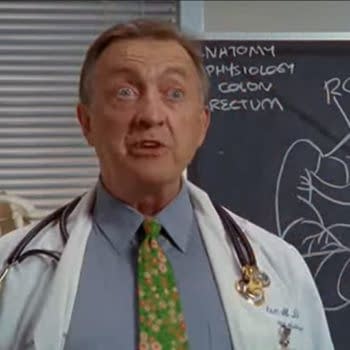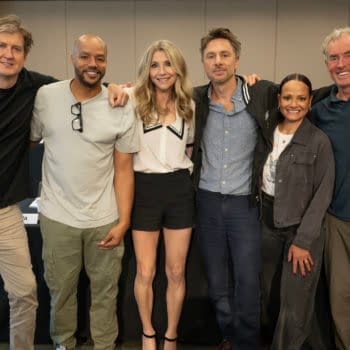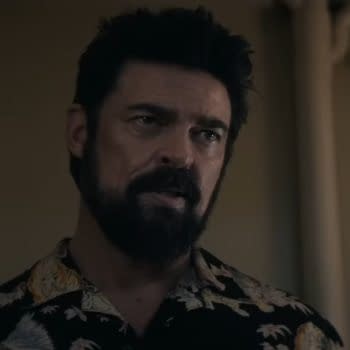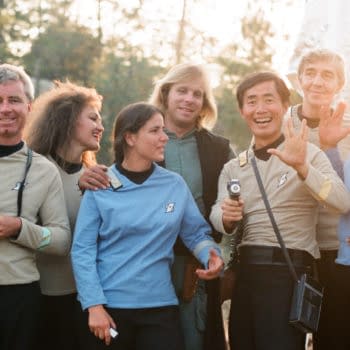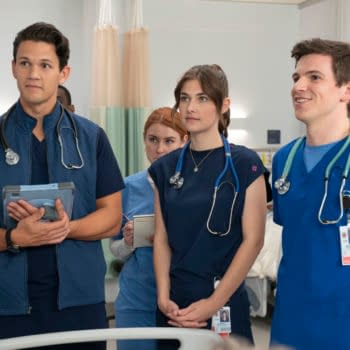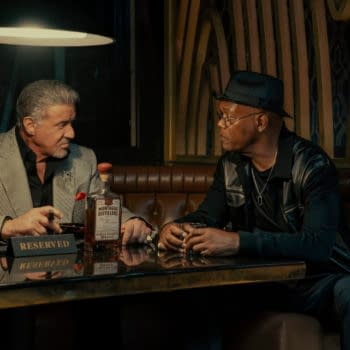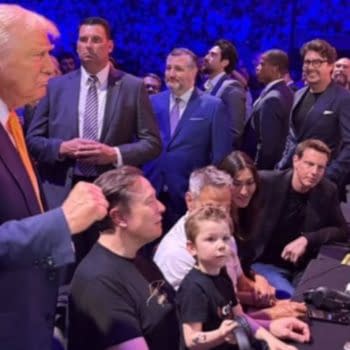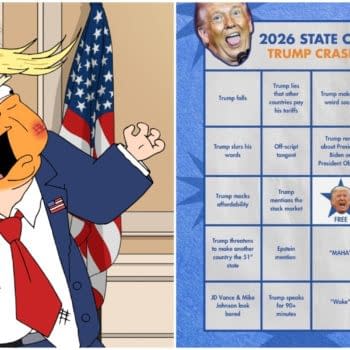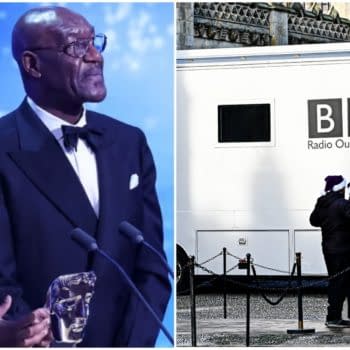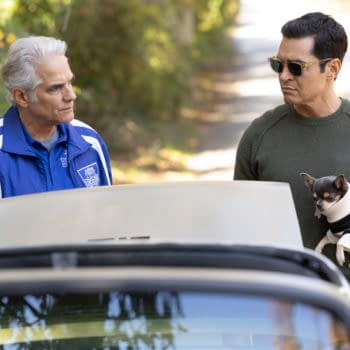Posted in: Netflix, Paramount+, Star Trek, TV | Tagged: Erin Macdonald, exclusive, interview, star trek, star trek: prodigy
Star Trek: Prodigy: Dr. Erin Macdonald on Science Consulting & More
Technical consultant/astrophysicist Dr. Erin Macdonald spoke with us about "Prodigy," making the science work in "Star Trek," and much more.
Dr. Erin Macdonald prides herself on bringing the "science" in science fiction as a technical consultant and actor in Hollywood, most notably in the Star Trek franchise, as a PhD in astrophysics. On top of her projects like the baby board book Star Trek: My First Book of Space and narrator for the Audible Original The Science of Sci-Fi with The Great Courses, she also runs her company Spacetime Productions, producing awarding-winning sci-fi films by LGBTQIA+ creators. Macdonald served as a technical consultant on all the Paramount+ and Netflix Trek franchise shows – including Discovery, Picard, Lower Decks, Strange New Worlds, and Prodigy. She's also done voicework for the Netflix and Nickelodeon animated series and the video game Star Trek Online. Outside of Star Trek, she's also consulted on the TV series Orbital Redux and the Prime Video film Space Cadet. Macdonald spoke to Bleeding Cool about her physics background, how the sci-fi convention scene caught the eye of Paramount, why Prodigy is such a great entry-level series, what's stopping humanity from prolonged space travel, and how science communication relies on good faith.
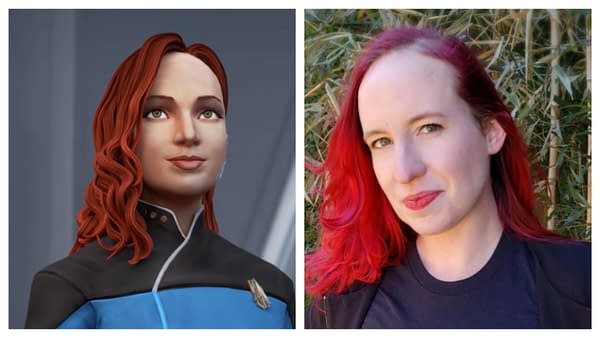
Erin Macdonald, PhD on Becoming Paramount's Go-to Science Consultant on Star Trek
Bleeding Cool: How did you get into Star Trek, and did that inspire your career path?
I wasn't exposed to Star Trek as a fan until I was in college with my fellow physics majors because there's a big intersection between physics majors and Star Trek fans. I got into it more in graduate school as I went through my career and left academic research. I taught for a bit, and then I went into engineering because the teaching didn't pay the bills. I still love teaching, but I started attending sci-fi conventions and giving talks on the physics of Star Trek, the science of 'Mass Effect,' and all these other things.
Eventually, I had the opportunity to move out to Los Angeles. At all these conventions, I met many writers, actors, and creatives who had projects they wanted to run past a scientist. I had the credentials as a super nerd and explained it to people. Eventually, CBS got wind of my Star Trek talks and invited me to give a talk at their licensed events and official conventions. That's how I got on CBS's radar while I advised other shows and living in LA. When season three of 'Star Trek: Discovery' started production, they had a new showrunner, had new things they wanted to do, and wanted to hire some science advisors.
I got put in the mix, interviewed for the job, and got it. As we went through that, it went well, and all these other shows were in pre-production or production. It was like, "This would benefit us to have a scientist as part of the franchise because then I can not only make sure the science is right, but also manage all the 'Star Trek' technobabble and assure we're consistent across all these different shows.
What does a series like 'Star Trek: Prodigy' do for new fans who don't have the advantage of catching up to the 55-plus-year history of the franchise?
Sitting down to watch 800 episodes of Star Trek seems a bit daunting. What's great about 'Prodigy' as an entry point for Star Trek for kids and adults, particularly if kids are familiar with IP animation like [Star Wars: The] 'Clone Wars.' The first couple of episodes of 'Prodigy' are familiar to them. It's an action-heavy sci-fi adventure as they enter the 'Star Trek' world. It's almost like you have 'Star Wars' characters that find themselves in 'Star Trek,' then they don't assume any knowledge, and we spend the first season [trying to familiarize] this concept called the "Prime Directive" and here's this concept called a "universal translator."
Here's all this stuff if you've watched Star Trek for the last 55 years, you know, but you forget other people have never heard of these things. It's a great entry point for anyone who wants to watch 'Star Trek,' and you don't need to know much. You'll get more out of it if you've seen 'Voyager' because the characters are back. By no means do you need to have watched any 'Star Trek' to watch 'Prodigy', and we've never had a show like that for the franchise, so that makes it special.
Is show business something you always thought of in the back of your mind, or did you fall into it?
I love the way you phrase it because it sat in the back of my mind. Growing up, I was obsessed with television and thought everyone loved TV as much as I did, and that's not true [laughs]. I'm sure I'm in good company, but what's wonderful about where my career path has gone is that TV and film made me want to be a scientist. I wanted to be a scientist because of Dana Scully [of 'The X-Files'] and Dr. Ellie Arroway [of 'Contact' (1997)], and then going through that path realizing a science career wasn't for me, getting more into storytelling, all the while loving film, TV, and how stuff is made. I watched every documentary on how every film was made, and then having that full circle moment now working on television. 'Prodigy' was the show that made me realize I want to be a TV writer, and I'm not meant to become Captain Janeway (Kate Mulgrew). I'm meant to write Captain Janeway and make these characters to inspire future scientists.
What are the biggest obstacles preventing humanity from prolonged and sustained space travel?
Money and emotional investment. We would be further along in space travel had we not had the Challenger and Columbia accidents happen, which I feel deeply scarred people and exposed them to the dangers of space travel. It shook everyone, setting space travel back for a long time, which happens. We must take space travel seriously and what's important is we have so many problems here on Earth that need solving. We feel space should be on the back burner, let's not worry, and fix our problems here before we go into space. Let's put our money here before we invest in exploring space.
I push back and say, "Space is hard, dark, scary, difficult, and if we want to take it seriously, we must overcome many technological and engineering challenges that can benefit us on Earth." We don't see what those are. Those are the known unknowns, and we know there are challenges there we must figure out. Once we do that, technology could help us on Earth, but we can't predict that. That's why science research and space travel are important.
Of all the consulting you've done, was there anything that gave you the most pause for technical-related issues?
Not particularly. I'm grateful with Star Trek, we have a collaborative environment where there will be some things where my advice is not explaining something [laughs]. We get ourselves in trouble if we try to explain it. The only time I got pushback was when we did the musical episode of 'Strange New Worlds' (Subspace Rhapsody) because I was told we were going to do a musical episode. I said, "Good luck!" [laughs] They said, "No, we need a scientific explanation for why they're all bursting into song." This is Star Trek and that's the legacy we're going for, so we used infinite multiverse theory and talked about a rupture that crossed multiverses, and then they must figure out how to undo that. I'm proud of how the explanations came about, it sounded scientific, the backbone of how it was, and it was fun to watch.
How do you feel about communication within the scientific community handles the balance between educating the public and combating misinformation spread online?
Love that question. It's so important for scientists to take science communication seriously. I interact with the public a lot through conventions and through the other things I do. I get asked tons of questions because I'm exposed to many people who don't get to meet a scientist regularly. These questions people have in their minds, and it's my responsibility not to make people feel dumb. It's a cliche we say, "There are no dumb questions," but it's important to believe that. If people ask in good faith, you should take every question seriously and ensure that the person understands your response. If you make people feel dumb, they'll be hostile the next time they talk with a scientist.
They're likely not asking because they don't want to be embarrassed again and feel dumb. No one wants to go through that. That creates animosity between people who don't have a scientific background and experts, and I see why it happens. It's not fair because science is not just about communicating, it's about a rigorous process. We are trained as scientists to understand what fact means, understand what experiments are theory versus results, and every scientist I know takes that seriously.
With so much misinformation, it can feel disheartening for scientists. We must stay positive and ensure the public feels they have access and genuine relationships with science. I take that seriously as a science communicator. If people ask in good faith, and you're a scientist, like if you get asked a flat earth theory, or "Did we land on the moon?" Sometimes, someone falls down a YouTube rabbit hole and is genuinely confused, and you shouldn't take that seriously. A good litmus test you can start with is asking, "Before we get into this, is there anything I would say that would change your mind?" If they say "No," they're not asking in good faith, and it's not worth having the conversation. Otherwise, you must engage with the public.
Both seasons of Star Trek: Prodigy are available to stream on Netflix.






